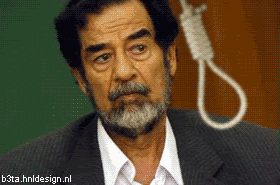The ISG - Talk is Cheap
So says Victor Davis Hanson:
Talking to Iran a Mistake for Strategic, Moral Reasons
By Victor Davis Hanson
By Victor Davis Hanson
One of the many bizarre recommendations in the recently released report from the bipartisan Iraq Study Group is the call to talk with Iran. A formal dialogue with the present Iranian leadership is, for a number of reasons, as misguided as it is amoral.
Our guides in these scary times of facing aggressive dictatorships still should be Winston Churchill and Franklin Roosevelt, not the British prime minister Stanley Baldwin and Joe Kennedy, the U.S. ambassador to Britain, who leading up to 1939 thought good could come out of talking with the Nazis.
First, the Iranian leadership goes beyond the usual boilerplate anti-Israel, anti-Semitic claptrap of the region. President Mahmoud Ahmadinejad has serially denied the Holocaust while promising the absolute destruction of Israel. Various mullahs have characterized Israel as a "one-bomb state," implying a single Iranian nuclear bomb could destroy it. The vicious hatred is so institutionalized in Iran's state-run media that a science-fiction TV series there depicts the evil alien queen as Jewish.
Why should we give stature to and empower a theocracy that apes the hatred of the Third Reich?
Second, in matters of nuclear proliferation, Iran demands increased vigilance, not dialogue. It possesses enough oil-based energy to meet its domestic needs for over 200 years and thus has no logical reason - other than for weaponry - to develop exorbitantly costly enriched uranium.
Plus, unlike similarly unstable Pakistan and North Korea, Iran has no nearby nuclear neighbors to keep it in check. Iran could rather easily threaten stability in the region - and thus the accessibility of most of the world's oil reserves.
Third, there is a long history of failed talks with, and appeasement of, the present Iranian government. The so-called EU3 - Britain, France and Germany - "dialogued" constantly and offered concessions while Tehran raced ahead with more centrifuges. The loquacious United Nations experienced the same frustration.
Remember the Iran-Contra scandal of 1986 - a mess that sullied the reputations of some of those now calling for renewed negotiations with Iran. In 1983, Iranian-backed Hezbollah kidnapped Americans in Lebanon. Some in the Reagan administration thought Iran could help free the hostages if we sold it arms. But all they proved was the old dictum that democracies should not eagerly beseech dictatorships from a position of perceived weakness.
Fourth, we have a deep misunderstanding of the nature and aims of the Iranian regime. Despite praise from Bill Clinton, Iran's "liberal" plebiscites were never democratic. Candidates were always carefully prescreened, free expression was curtailed, and dissident voices were jailed (and worse). Before 9/11, Hezbollah, with Iran's help, had killed more Americans than any other terrorist organization. No wonder President Ahmadinejad now asks crowds to envision "a world without America."
The Iraqi Study Group says Iran also worries about spillover chaos in Iraq. That is laughable. The opposite is true. The present killing and violence in Iraq divert American attention away from its effort to go nuclear and its interests in Lebanon. As Yahya Rahim Safavi, the commander of the Iranian Revolutionary Guards Corps, gleefully put it, "The Americans are sunk in the quagmire of Afghanistan and Iraq, and there is no way for them (to move either) forward or backward." So, if Iran finds benefits in an unstable Iraq, why would it wish to play a constructive role?
Instead of worrying about negotiating with Iran, we need to be primarily preparing for the awful day when Iran can arm its missiles with nuclear weapons. President Bush should keep pressing for tough U.N.-endorsed global trade sanctions against Iran for violating the United Nations' own resolutions. And instead of talking to murderous mullahs, we should reach out more to Iranian democratic dissidents.
Ultimately, though, only collapsing the world oil price to below $30 a barrel can stop Iran's ability to fund terrorists, buy costly weapons and develop its nuclear program. We can achieve that through increased domestic drilling, energy conservation and an embrace of alternative energy.
In the short term, America must stay focused on rethinking its tactics to stabilize Iraq. Iraqi democracy as well as consensual governments in surrounding Afghanistan and nearby Lebanon are Tehran's worst nightmares - because these are true revolutionary movements that might resonate with Iran's own unhappy youth.
To deal with Iran, America should smile, lower the rhetoric, keep our powder dry - and maintain our distance.


























0 Comments:
Post a Comment
<< Home